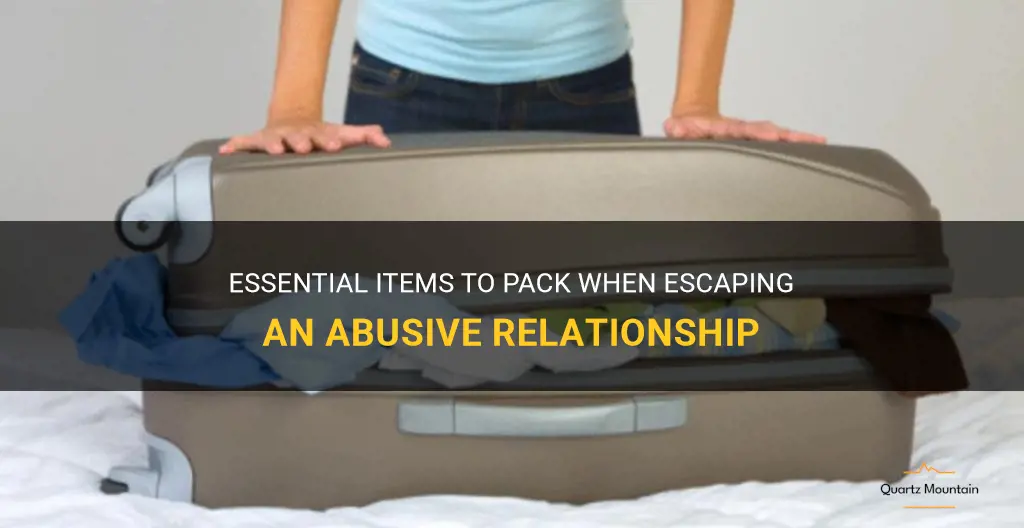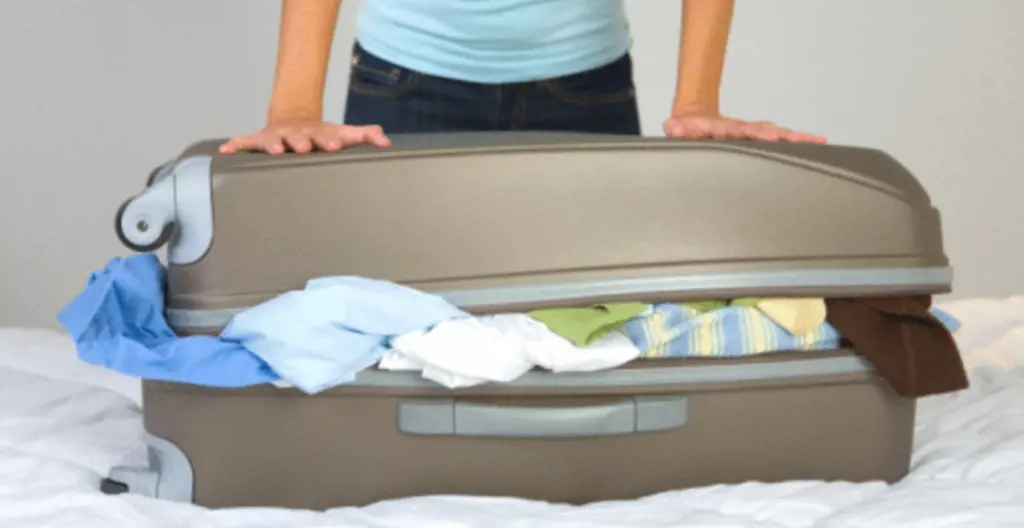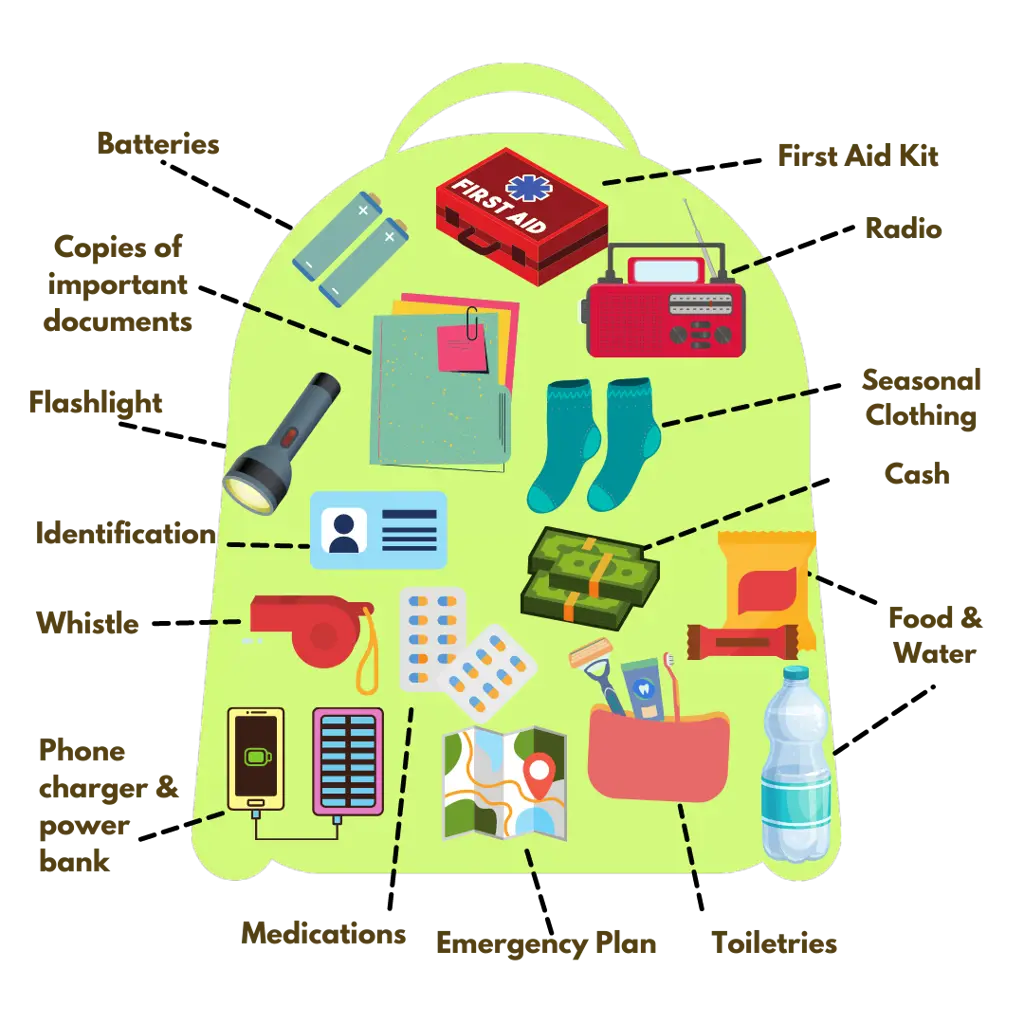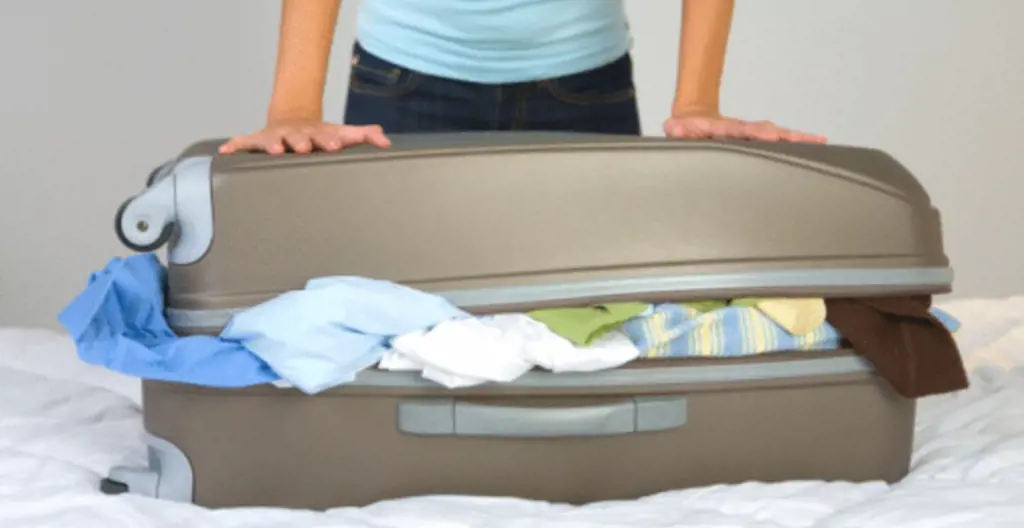
Leaving an abusive relationship takes immense bravery, strength, and careful planning. As survivors embark on their difficult journey to escape and rebuild their lives, one essential aspect is ensuring that they have the necessary items packed to navigate the challenges that lie ahead. From important documents to personal essentials and a safety plan, this guide will explore the essential items that survivors should consider packing when escaping an abusive relationship.
What You'll Learn
- What are the essential items to pack when leaving an abusive relationship?
- How can I ensure the safety of important documents and personal identification when leaving an abusive relationship?
- Are there any specific items or supplies that are often overlooked when leaving an abusive relationship?
- What strategies can I employ to pack discreetly without arousing suspicion from the abuser?
- How do I plan for the immediate needs of myself and any children involved when leaving an abusive relationship?

What are the essential items to pack when leaving an abusive relationship?

Leaving an abusive relationship can be a challenging and daunting task. It requires careful planning and consideration to ensure your safety and well-being. One crucial aspect of leaving is knowing what essential items to pack to help you start a new life and maintain your independence. In this article, we will discuss some of the essential items you should include in your departure plan.
- Important Documents: Gather all your important documents, such as your identification cards, passport, driver's license, birth certificate, Social Security card, health insurance cards, and any legal documents related to your relationship or children. These documents are crucial for establishing your identity and accessing necessary services.
- Financial Resources: It is important to secure your financial independence when leaving an abusive relationship. Make sure to bring any cash you have on hand, as well as credit cards, debit cards, and checkbooks. If possible, open a separate bank account that your abuser does not have access to. Consider transferring any joint accounts into your name or closing them altogether to protect your finances.
- Phone and Chargers: Your phone can be a lifeline in an emergency situation. Make sure to bring your phone, charger, and any other electronic devices you rely on. It may also be helpful to have a prepaid phone or SIM card as a backup in case your abuser tries to monitor your communications.
- Medications and Medical Supplies: If you have any prescribed medications, make sure to take an adequate supply with you. Pack any necessary medical equipment, such as inhalers or insulin, along with your medical records and health insurance information. It is crucial to prioritize your physical health during this transition.
- Clothing and Personal Items: Pack a few changes of clothes for yourself and your children, as well as underwear, socks, and shoes. Remember to include any necessary hygiene products, toiletries, and feminine hygiene products. These items will help provide a sense of comfort and normalcy during a difficult time.
- Emotional Support Items: Leaving an abusive relationship can be emotionally draining. Bring any items that provide you with comfort or help you relax, such as a favorite book, journal, or keepsakes. Consider packing photos of loved ones who can offer emotional support.
- Childcare and Pet Supplies: If you have children, gather their essential items, including clothes, diapers, formula, favorite toys, and any necessary documents, such as birth certificates or vaccination records. If you have pets, bring their food, water bowls, leashes, and any medications they may require.
- Legal and Protection Resources: If you have obtained a restraining order or protection order, make sure to bring copies of these documents with you. It is also helpful to have contact information for local legal aid organizations, domestic violence hotlines, and shelters in case you need their assistance.
Remember that leaving an abusive relationship can be dangerous, so it is essential to prioritize your safety. Inform someone you trust about your plans and develop a safety plan in case of emergencies. Seek professional help from therapists, counselors, or support groups to navigate this challenging period. You deserve a life free from abuse, and taking the necessary steps to leave is the first step towards achieving that.
Essential Items to Pack in Your Carry-On for Delta Flights
You may want to see also

How can I ensure the safety of important documents and personal identification when leaving an abusive relationship?

Leaving an abusive relationship can be a challenging and dangerous process, and ensuring the safety of important documents and personal identification is crucial. These documents include your identification cards, passport, social security card, birth certificate, financial documents, and any other important paperwork. Here are some steps to help you in this process:
Assess the situation:
Before taking any actions, evaluate the level of danger you may be facing. Is your partner monitoring your movements, finances, or communication? If there is a significant risk of physical, emotional, or financial harm, reach out to a domestic violence hotline or local law enforcement for guidance.
Make copies:
Start by making copies of all your important documents. This includes identification cards, passports, social security cards, birth certificates, and financial paperwork. Keep these copies in a safe location outside your home, such as a trusted friend or family member's house, or a safe deposit box at a bank.
Secure original documents:
If possible, secure the original documents in a safe and hidden place within your home. Choose a location that your partner is unlikely to search, such as a locked drawer or a hidden wall safe. If necessary, consider purchasing a fireproof and waterproof document bag or safe to keep these items protected.
Change passwords and PINs:
Ensure the security of your online accounts and financial information by changing passwords and PINs associated with them. Avoid using easily guessable passwords and consider using a password manager tool for added security. It's important to choose unique passwords for each account.
Update contact information:
Notify your bank, credit card companies, healthcare providers, and any other relevant institutions about your change of address and contact information. Consider using a private mailbox service or a friend's address as your permanent address to maintain confidentiality.
Establish financial independence:
Create separate bank accounts and credit cards that are solely in your name. Close any joint accounts that you shared with your partner. By establishing financial independence, you reduce the risk of your partner having control over your finances or using them against you.
Seek legal advice:
Consult with an attorney who specializes in family or domestic violence law. They can guide you through the legal process and help you navigate issues such as divorce, child custody, and protection orders. They can also inform you of any necessary documentation required for your specific situation.
Consider a protective order:
If you believe your safety is at risk, consider obtaining a protective order or restraining order against your abuser. This legal document can provide you with additional protection and prohibit your partner from contacting or coming near you.
Secure your digital presence:
Change all of your online passwords, including those for email, social media, and shopping accounts. Enable two-factor authentication whenever possible. Be mindful of what you share online and review your privacy settings to restrict access to your personal information.
Remember, leaving an abusive relationship can be a complex process, so it's essential to have a safety plan in place. Seek support from trusted friends, family, and professionals who can provide guidance and resources. Stay aware of your surroundings and trust your instincts. Your safety is of utmost importance.
Essential Items to Pack for the Bride on Her Wedding Day
You may want to see also

Are there any specific items or supplies that are often overlooked when leaving an abusive relationship?

Leaving an abusive relationship is a courageous step towards a healthier and safer life. However, it is important to plan carefully and consider all necessary items and supplies before making this transition. While there are common essentials like identification documents, money, and clothing, there are also several specific items that are often overlooked in the process. In this article, we will explore some of these overlooked items and supplies that can play a crucial role in ensuring a smooth and successful departure from an abusive relationship.
- Important Legal Documents: Apart from identification documents such as passports, driver's licenses, and social security cards, it is essential to gather all legal documents including birth certificates, marriage certificates, divorce papers, restraining orders, and any court records related to the abuse. These documents can be crucial in proving your identity, protecting your rights, and obtaining legal assistance if necessary.
- Financial Documents: Gathering financial documents such as bank statements, credit card statements, loan agreements, and tax returns is essential for establishing your financial independence and ensuring a secure financial future. These documents can help you in accessing your own funds, freezing joint accounts, and taking the necessary steps to protect your credit history.
- Medical Records: It is crucial to gather medical records, prescriptions, and health insurance information for both yourself and any children involved. These records can provide valuable information about your health history, ongoing treatments, and any evidence of abuse that might be helpful in legal proceedings or obtaining protection orders.
- Personal Belongings: While it may seem obvious, many people often overlook the importance of gathering personal belongings that hold sentimental value or are essential for daily living. This includes favorite photographs, sentimental items, clothing, toiletries, and personal hygiene products. These items can provide comfort and a sense of familiarity as you rebuild your life away from the abuser.
- Contact Information: Make sure to have a list of important contact information, including emergency numbers, trusted friends or family members who can provide support, local domestic violence shelters, crisis hotlines, and legal aid services. Having this information readily available can be incredibly helpful during a crisis situation or when seeking assistance or advice.
- Survival Kit: As you plan to leave an abusive relationship, it is important to have a survival kit prepared, containing items such as a prepaid cell phone, emergency cash, a spare set of keys, important addresses and phone numbers, a change of clothes, some non-perishable food items, and any necessary medications. This kit should be easily accessible and kept in a safe location that can be accessed quickly when needed.
- Emotional Support Resources: Leaving an abusive relationship can be emotionally challenging, and having a support system in place can make a significant difference. Connect with local support groups, survivors' networks, therapists, or counselors who specialize in domestic violence. These resources can provide emotional support, guidance, and help in developing a plan for your future.
Leaving an abusive relationship requires careful planning and consideration of various aspects to ensure a successful transition. By being mindful of these often overlooked items and supplies, you can better equip yourself for a safe and empowered departure. Remember, reaching out for help and support from trusted individuals and organizations is essential in making this journey towards a brighter and healthier future.
Essential Packing List for an Overnight Stay at Kedarnath
You may want to see also

What strategies can I employ to pack discreetly without arousing suspicion from the abuser?

Title: Strategies for Discreetly Packing Without Raising Suspicion from an Abuser
Introduction:
When planning to leave an abusive situation, it is essential to prioritize your safety and take precautions to avoid arousing suspicion from the abuser. Discreetly packing your belongings can be a crucial step in this process. Here, we outline several strategies to help you pack while minimizing the risk of detection.
Plan Ahead:
Before packing, develop a detailed plan to ensure a smooth and discreet process. Consider the time when the abuser will be away and use that opportunity to pack without interruption. Make a checklist of essential items you need to pack, focusing on necessary identification documents, money, clothing, and key personal belongings.
Pack Incrementally:
To avoid raising suspicion, pack your belongings gradually rather than all at once. If the abuser becomes aware of a sudden packing spree, it may escalate the risk of violence or prevent you from leaving. Choose inconspicuous moments to pack a few items every day. This strategy will also help you assemble essential supplies and prevent you from forgetting critical items.
Use Decoy Items:
To divert attention away from your primary packing efforts, create decoy situations and distractions. For example, you can pack a suitcase with non-essential items visible on top, making it seem like you are merely organizing your belongings. Place clothing items or other items easily repackable on top while stashing necessary items underneath or in less accessible areas.
Secure Storage Option:
Consider utilizing a storage unit or a trusted friend's house to store your packed belongings temporarily. This reduces the chances of the abuser discovering your packed items and sabotaging your plans. Ensure the storage location is secure, and only share this information with individuals who can be trusted explicitly.
Disguise Packing Materials:
Use common household items to disguise your packing materials. Instead of using traditional boxes or suitcases, opt for inconspicuous containers such as laundry baskets, gym bags, reusable grocery bags, or diaper bags. This way, you can create the illusion of everyday activities while discreetly packing your essential belongings.
Pack Overnight Bags:
Prepare a few overnight bags with a change of clothes, toiletries, and necessary documents. These bags can be stored in different locations to have an emergency escape option readily available. In case you need to leave unexpectedly, having pre-packed bags will enable you to move swiftly without arousing suspicion.
Consider Digital Storage:
Important documents, sentimental photos, and personal information can be discreetly stored digitally. Scan and upload essential documents and save sentimental photos to a secure cloud storage service. This ensures that even if physical copies are discovered or misplaced, you have access to vital information when needed.
Seek Professional Assistance:
If you are uncertain about packing discreetly or fear the consequences of being discovered, reach out to experienced professionals. Organizations specializing in assisting victims of abuse can provide valuable advice, safety planning assistance, and resources to ensure secure packing and safe relocation.
When planning to leave an abusive situation, packing discreetly is crucial for your safety. By planning ahead, packing incrementally, using decoy items, securing storage options, disguising packing materials, and seeking professional assistance, you can minimize the risk of arousing suspicion from the abuser. Remember, your safety is paramount, and these strategies can help you navigate the process more safely and securely.
Essential Items to Pack in an Autism Backpack for Daily Support
You may want to see also

How do I plan for the immediate needs of myself and any children involved when leaving an abusive relationship?

Title: Planning for Immediate Needs When Leaving an Abusive Relationship
Introduction:
Leaving an abusive relationship requires careful planning to ensure the safety and well-being of yourself and any children involved. This article provides a step-by-step guide on how to plan for your immediate needs when leaving an abusive relationship, combining both scientific insights and practical experience.
Assess the Situation:
Recognize and acknowledge the signs of abuse, including physical, emotional, and financial abuse. Consult with a domestic violence counselor, therapist, or helpline to gain a better understanding of your situation and discuss your options.
Create a Safety Plan:
Develop a safety plan that outlines your steps for leaving safely and efficiently. Consider the following:
A) Secure Important Documents: Gather and make copies of important documents such as identification, passports, birth certificates, social security cards, financial records, and health insurance papers. If possible, store them in a safe place outside the home.
B) Emergency Contacts: Compile a list of trusted friends, family members, shelters, helplines, and local domestic violence organizations. Ensure you have their contact information readily available in case of emergencies.
C) Safe Escape Routes: Identify the fastest and safest escape routes from your home. Familiarize yourself with nearby public places, police stations, and safe locations where you can go in case of immediate danger.
D) Pack a Bag: Prepare an emergency bag with essentials such as clothing, medication, important documents, a phone charger, and any necessary items for your children. Keep the bag in a discreet and easily accessible location.
Secure Finances:
Financial independence is crucial when leaving an abusive relationship. Take the following steps to secure your finances:
A) Open Personal Bank Accounts: Open a personal bank account that the abuser does not have access to. Ensure that it is at a different bank and consider using a P.O. Box for all correspondences.
B) Separate Finances: If you share joint accounts with the abuser, withdraw or transfer money to your new personal account. Cancel or freeze any joint credit cards to prevent further financial abuse.
C) Seek Legal Advice: Consult with a lawyer specializing in family law to understand your rights regarding child support, alimony, and property division. They can provide guidance on obtaining protection orders, restraining orders, or emergency custody if necessary.
Secure Housing:
Finding safe and stable housing is crucial for your immediate needs. Consider the following steps:
A) Shelter Options: Research and contact local shelters or safe houses that provide accommodation for survivors of abuse. They can offer temporary housing and assistance in finding a more permanent solution.
B) Stay with Supportive Friends or Family: Reach out to trusted friends or family members who can provide a safe place for you and your children to stay temporarily.
C) Obtain Protective Orders: If you feel that you need immediate legal protection, consult with a lawyer and file for a protective order or restraining order against your abuser. These orders can help secure your housing situation and provide an added layer of safety.
Seek Emotional Support:
Leaving an abusive relationship can be emotionally draining. Seek emotional support from therapists, counselors, support groups, and helplines. They can provide guidance, resources, and validation for your experiences.
Leaving an abusive relationship is a challenging, but essential, step towards creating a safer and healthier future for yourself and your children. By following the steps outlined in this article, you can better plan for your immediate needs, ensuring a smoother transition as you work towards healing and rebuilding your life. Remember, you are not alone, and there are resources available to support you throughout this journey.
What to Pack for Iceland in November: A Comprehensive Guide
You may want to see also
Frequently asked questions
When leaving an abusive relationship, it is important to pack essential items that will help you establish a sense of safety and security. These items include identification documents such as your driver's license, passport, birth certificate, and social security card. It is also important to pack any medication you may need, as well as a change of clothes and personal hygiene products.
If you are unable to pack all of your belongings when leaving an abusive relationship, prioritize the items that are most necessary for your immediate well-being and safety. This may include important documents, personal items with sentimental value, and essentials like medication and clothing. If possible, enlist the help of a trusted friend or family member to store or retrieve your remaining belongings at a later time.
Yes, it is important to pack money and financial documents when leaving an abusive relationship. Having access to your own funds will provide you with a level of independence and support as you start to rebuild your life. Gather financial documents such as bank statements, credit cards, and any other important paperwork related to your financial well-being.
Yes, it is important to gather and pack important legal documents when leaving an abusive relationship. These documents may include a copy of your restraining order, custody and divorce paperwork, rental or mortgage agreements, and any other legal documents that may be relevant to your situation. These documents will help establish your legal rights and protect your interests.
It is strongly recommended not to leave your pet behind when leaving an abusive relationship. Abusers may use pets as a form of control or to further harm their victims. If possible, make arrangements to bring your pet with you, such as finding a safe place for them to stay temporarily or seeking assistance from a local animal shelter or domestic violence organization.







